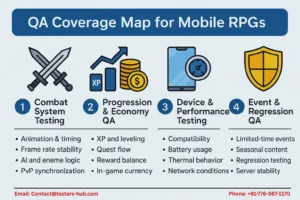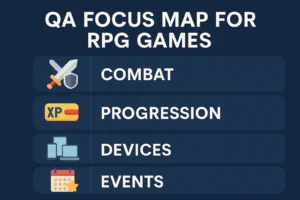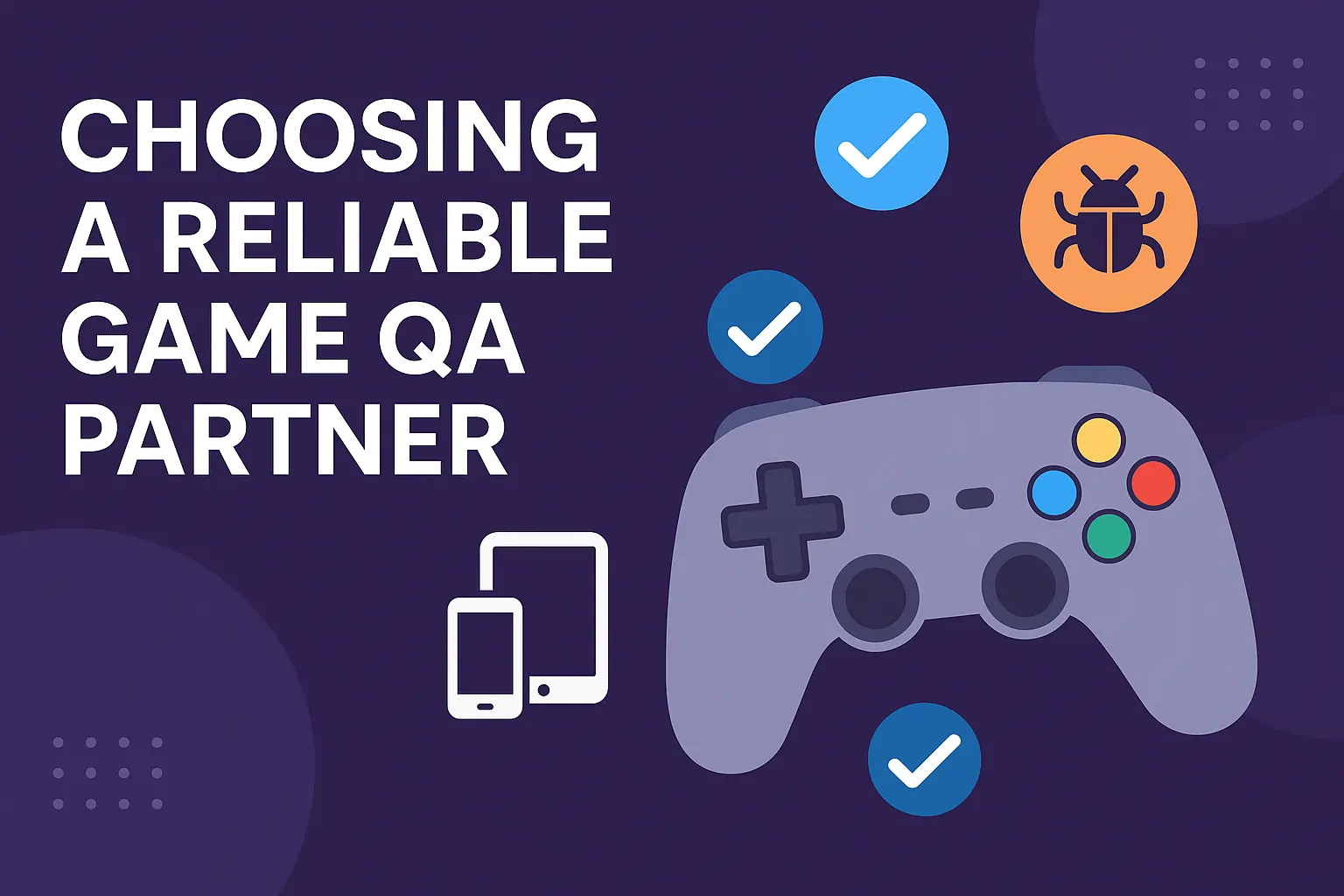Mobile RPG QA: Testing Complex Combat and Progression Systems
Introduction: Why RPG Games Demand Deep QA Coverage
Role-playing games (RPGs) are among the most immersive and rewarding genres in mobile gaming. They combine storytelling, skill-based combat, and layered progression systems that keep players hooked for hours. However, with such complexity comes high testing demands.
Even a small issue in combat timing, skill cooldowns, or reward progression can ruin the player experience. In fact, studies show that more than 60% of game-related complaints are caused by gameplay imbalance or progression bugs.
Therefore, mobile RPG QA plays a critical role. It ensures combat feels fluid, storylines remain consistent, and player progression stays fair. Without rigorous QA coverage, even a well-designed RPG can lose its charm within days of release.
👉 Developing an RPG with advanced combat and progression systems?
Why RPG Testing Is More Complex Than Other Genres
Unlike casual or arcade games, RPGs contain interconnected systems that depend on one another. Each gameplay feature — whether combat, inventory, or progression — directly impacts others. Consequently, the QA effort required is significantly higher.
RPG QA becomes complex because:
- Gameplay systems overlap: combat, crafting, skills, quests, and storylines are interdependent.
- Balancing changes constantly: player power scales with progression, so testing must adapt.
- Persistent data: everything — from loot to achievements — must sync correctly across sessions.
- Network dependency: online RPGs require perfect server synchronization and rollback handling.
As a result, a single unchecked bug can ripple through multiple systems. That’s why end-to-end game testing is not optional — it’s essential for stability and player trust.
Combat System Testing — Timing, Sync, and Skill Logic
Combat defines the rhythm and feel of every RPG. Therefore, testing this area requires both precision and creativity. Testers need to replicate real-player actions, verify timing accuracy, and ensure combat feels balanced across all characters and levels.
Key QA focus areas include:
- Animation & skill timing: Attacks, dodges, and skills must trigger consistently.
- Frame rate stability: Frame drops can cause timing mismatches during boss fights.
- Combo & cooldown logic: Abilities must reset correctly to avoid infinite loops.
- AI difficulty scaling: Enemies should adapt gradually without becoming unfair.
- PvP synchronization: Combat across devices and networks should remain perfectly synced.
Furthermore, testers must analyze how abilities behave under lag or unstable connections. Because real players face varying network conditions, testing across different speeds ensures smooth, fair combat for everyone.
Progression System QA — Leveling, Rewards, and Economy Balance
Progression keeps RPG players motivated. However, if the leveling curve feels inconsistent or the reward system seems unfair, players quit quickly. Hence, QA must verify that every milestone — from early quests to late-game achievements — feels balanced.
QA teams test:
- XP and level scaling: Experience rewards should match effort.
- Economy balance: Currency, item drops, and crafting costs must feel fair.
- Quest logic: Missions should trigger, progress, and complete correctly.
- Save data reliability: Progress must remain intact even after crashes or restarts.
- Fair monetization: In-app purchases should enhance gameplay, not break balance.
Additionally, testers perform long-duration sessions to catch progression blockers that appear only after extended play. This helps identify fatigue points and pacing issues before the game reaches players.
💡 Fact: Players who face progression errors are 3× more likely to abandon the game within the first week.
Testing Across Devices and Platforms
Every RPG must perform consistently across a wide range of devices. Since mobile players use everything from flagship models to budget phones, compatibility testing becomes crucial.
QA coverage includes:
- Performance testing: Evaluating CPU, GPU, and memory behavior during long sessions.
- Thermal and battery testing: Ensuring no overheating or rapid drain during intense battles.
- Cross-device saves: Verifying data consistency across Android, iOS, and cloud storage.
- Localization testing: Checking text and dialogue across multiple languages.
In addition, new device launches during the year — like the iPhone 16 or Galaxy S24 — make it vital to re-run compatibility tests frequently. Regular updates ensure no player is left behind due to hardware variation.
👉 At Testers HUB, we test across 25+ real devices including Pixel, Samsung, and iPhone series for accurate QA results.
Regression, Load, and Event Testing for RPGs
RPGs evolve continuously through patches and events. Because of this, QA must remain active even after launch.
Key testing types include:
- Regression testing: Verifying old systems after each update.
- Load testing: Measuring performance when thousands of players log in simultaneously.
- Event testing: Ensuring limited-time missions or seasonal content work flawlessly.
- Backend validation: Checking server data, leaderboards, and inventory sync under stress.
Moreover, since most RPGs now run live events during holidays or festivals, QA teams must prepare in advance. Testing every new event thoroughly helps prevent crashes, progression errors, and duplicate reward issues.
Why Outsourcing RPG QA Saves Time and Resources
Testing RPGs in-house is time-consuming and resource-heavy. Outsourced QA teams, however, bring scalability, speed, and domain expertise — especially for complex, combat-driven titles.
Benefits include:
- Parallel testing on multiple devices.
- Experienced testers familiar with RPG mechanics.
- Quick turnaround for new builds and patches.
- Detailed bug reporting and retesting cycles.
- Cost-effective coverage across time zones.
Therefore, outsourcing is often the best approach for studios that want to speed up QA without compromising quality.
👉 Need scalable QA for your RPG?
Conclusion: Precision QA = Better Player Loyalty
In RPGs, gameplay balance and combat fluidity define player satisfaction. When everything — from skill timing to reward pacing — works seamlessly, players stay loyal longer.
By investing in mobile RPG QA, studios build a foundation of trust and long-term engagement. With Testers HUB, your game’s combat and progression systems are tested across devices, networks, and real-world conditions to guarantee smooth, fair gameplay.
👉 Launch your RPG confidently this year.
Frequently Asked Questions (FAQ)
Q1. Why do mobile RPGs need specialized QA?
Because RPGs combine combat logic, leveling, economy, quests, and live events; therefore, bugs in one system can break others without end-to-end testing.
Q2. What are the must-test areas for RPG combat?
Animation timing, hit-registration, skill cooldowns/combos, enemy AI scaling, frame-rate stability, and PvP sync across networks and devices.
Q3. How do you test progression and economy balance?
We simulate short and long play sessions, verify XP curves and drop rates, validate quest triggers, and run A/B tuning to prevent grind walls or pay-to-win spikes.
Q4. Which devices and environments should be covered?
Prioritize recent iPhone and flagship Android models plus popular mid-range devices; additionally, test under varied networks (3G/4G/5G/Wi-Fi), battery/thermal conditions, and different OS versions.
Q5. When should a studio consider outsourcing RPG QA?
When releases are frequent, device coverage is limited, or you need rapid regression on events and patches; outsourcing adds parallel testing, real-device labs, and faster turnaround without hiring overhead.












